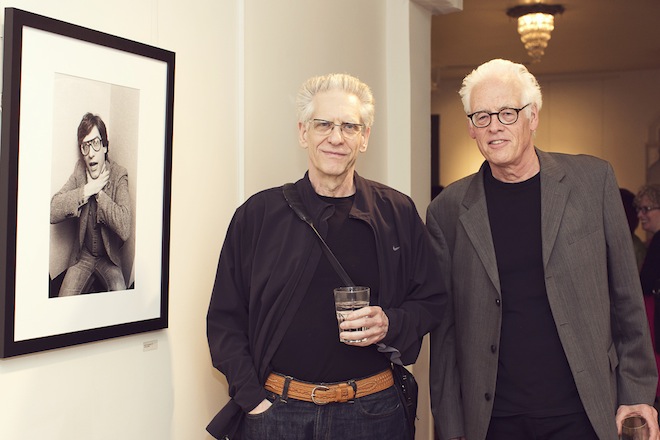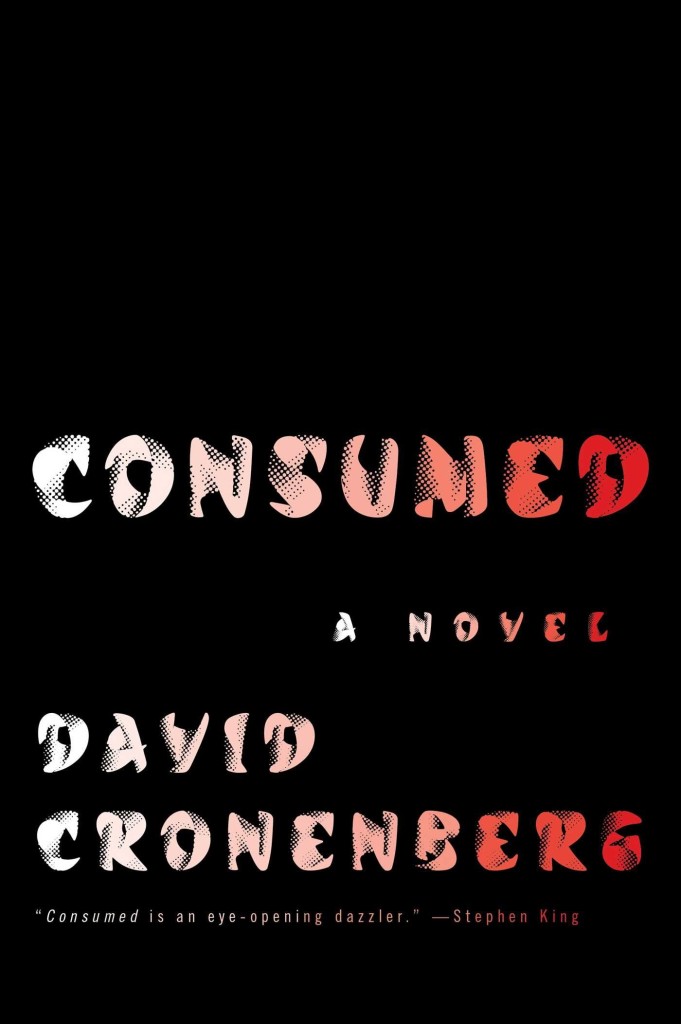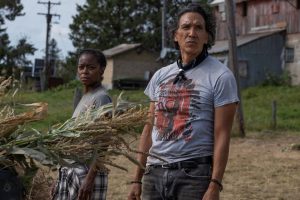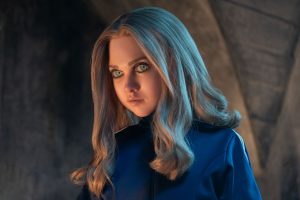Reviews include Superman, Apocalypse in the Tropics, and To a Land Unknown.
Veterans of their Crafts: Brian Johnson and David Cronenberg
November 21, 2014
At 71, David Cronenberg has finally fulfilled the dream of his youth. Inspired by authors like Vladimir Nabokov and William Burroughs, he had always planned on being a novelist. He diverted that ambition into cinema for half a century, but never let go of it. This fall, as Cronenberg’s 21st feature film Maps to the Stars hit theatres, his debut novel Consumed was in bookstores. It’s a tale of a journalist couple, Naomi and Nathan, who have a proclivity for sleeping with their subjects. From different angles, they converge on the sensational story of a famous French philosopher, Aristide Aristeguy, whose wife has been found murdered and partly eaten, presumably by Aristide. The book, which is at least as audacious as the director’s more daring films, offers a more diverse repertoire of pathological curiosities than a movie could possibly embrace. These days I’ve sworn off film journalism to focus on producing and directing a feature documentary (Al Purdy Was Here). But after reading Cronenberg’s novel, I felt compelled to talk to him about the process of writing, and how it differs from filmmaking. We waited until had wrapped his hectic interview schedules, for both the film and the book.

Brian Johnson: I’d mentioned to your assistant that I wanted this to be a conversation, not an interview. I’m no longer a working journalist, at least for the moment.
David Cronenberg: You’re even not allowed to do interviews.
BJ: My license is suspended. I’m still not sure what the difference is between an interview and a conversation. But I once asked Errol Morris what the secret to conducting a good interview, and he said: “shutting up.”
DC: It depends. If you’re a para-journalist, like some of the characters in my novel, then you are deliberately creating yourself as one of the characters in the exchange. So what you say is as important as your interviewee.
BJ: Well, I read Consumed back in August, at a cottage where I had the galleys. And strangely enough, the book I read right after it was The Flamethrowers, without being remotely aware of the connection between the two books.
DC: Yeah, that is odd. Because The Flamethrowers is one of the things that the people at Simon & Schuster (who are publishing me in the States) sent me. It surprised me because it was a woman [Rachel Kushner] writing about motorcycles and that’s not a usual thing. She also invented her own brand of motorcycles, which I had done in my only other attempt to write a novel, and that was in the early ’70s, when I was living in the South of France riding motorcycles through the Maritime Alps, totally obsessed with motorcycles and connected with the locals because they were all riding little 49 cc. café-racers. If it was under 50ccs you didn’t need a license. They were zooming around on these really tiny but cute two-stroke racer bikes. And I was building my novel around fantasies connected with all of that, and living in this medieval town.
BJ: I have no experience with motorcycles, but I felt a lot of personal resonance as I read Consumed. Here I am, a lifelong journalist making my first movie, reading a book by a lifelong filmmaker writing his first novel. And it’s a novel about a journalist couple—I’m part of a journalist couple. [There’s also a narrative intrigue set inside the jury of the Cannes Film Festival, which I’ve attended for two decades.] Still, what’s remarkable about the book not its familiarity, but its strangeness. I felt I was reading a novel by a filmmaker thrilled to be doing everything he could not do in a movie. Is that true?
DC: I wasn’t thinking about movies at all when I wrote it. I certainly experienced a kind of liberation, and an ability to be discursive and rambling and open, which you don’t find when you’re making movies. Like the ability to do inner monologue. In New York I did a Q&A with a novelist, Rick Moody, who wrote The Ice Storm. He had written a piece about his experience having book made into a film, and said he felt that movies were always in the third person and that novels were always in the first person—not grammatically, just emotionally and creatively. I think there’s a real truth in that.
BJ: So a novel is more personal by definition.
DC: More than definition. Just by the form itself. I felt it was much more intimate than filmmaking. Even as a director who is also partly a producer and maybe has written the script, which is about as intimate you can get making a movie, and my early films I would have shot and edited myself as well. But still . . . there’s an actor out there and a camera between you and the actor. Then there’s the distance from the screen when you’re sitting in a cinema, and the distance from a book when you’re holding it in your hands. Now of course people are now intimately watching movies on their iPads that are exactly the same distance from their face as a book. And that is a strange hybrid experience. Just as McLuhan said, when movies are on TV they are no longer movies. They are TV. So I wonder if watching a movie on your iPad makes it more like a reading experience. We’ll see how that evolves.
BJ: But the creation of a film still requires a machine, and an ensemble. There’s a divine economy to writing. You can build the set, light it, direct your characters all with the stroke of a pen or the tap of a keyboard—and I assume in your case it’s the latter.
DC: Yeah, definitely. I’m aware of the machinery when I’m writing it. There is a big machine here. I have a Kinesis contour keyboard, which is an eccentric keyboard, and I type using the Dvorak layout, and I have a 27-inch iMac that is a 5K screen, so there’s a lot of machinery even when I’m writing. It doesn’t have to be, of course. You can do it with a pen. But that’s still technology. Language is technology; writing is technology. But writing a novel is much more like directing than it is like screenwriting. Screenwriting is very restrictive and it does not encourage the kind of discursive thought that a novel does encourage. You’re doing the lighting, the casting, the costumes, the make-up—everything when you write a novel.
BJ: As a director, you’re famous for exploring taboo terrain and filming the un-filmable. When you made Naked Lunch, it was said that you had filmed an un-filmable book. But with your novel I felt you were writing something that even you would find un-filmable.
DC: There are always aspects of a novel that are un-filmable, the inside-your-head aspects. I always hate movies that are adapted from books and you hear a voice-over of somebody reading the book to you while you watch the pictures. That’s an immediate admission of failure to figure out how to recreate the book in cinematic terms.
BJ: It often comes from a misguided attempt to honour the prose, to frame the sentences for us to admire.
DC: When I was talking to Don DeLillo—he had just read my screenplay for Cosmopolis—he said I wonder how you’re going to handle Benno’s journal. This was the character played by Paul Giamatti, who you meet only at the end of the movie. But chapters from his journal interlace the book all the way through. He said, “I was wondering how you were going to handle that and the way you handled it was by leaving it out.” The audience doesn’t know who this guy is until the end of the movie. He’s a brand new character who appears out of nowhere and in the novel that’s not the case at all.

BJ: In asking about filming the un-filmable, I was actually referring to what not allowed to do in a movie.
DC: I was starting from the top, the things that are genuinely not filmable because of the difference between the two media. But then there’s this social question: what would you be allowed to release? Obviously you’re allowed to film it, but can you get financing for that? You have extensive breast surgery—breast amputation—in the book. How would that go down on screen? Physically you could create it. But how palatable would it be? What kind of rating would the film get, etc., etc.?
BJ: It would be difficult to film the graphic example of Peyronie’s disease, the common yet little talked-about condition of curvature of the penis due to mysterious scarring. This has to be the first time Peyronie’s disease has been outed in literary fiction.
DC: It would be great to do it in cinema, I guess. But when people talk about Naked Lunch being un-filmable, it was more a creative question. There were some extreme sexual things that would be considered problematic, but it was also a conceptual thing—how do you make this comprehensible in a movie? In this case, we’re talking about the problems of financing and distribution when you’re doing taboo things on screen, but I have five, now six, producers who I’ve worked with before who all say they want to make a movie out of Consumed. So they think it’s possible. And that’s without confronting the details one would get into when writing it.
BJ: You’ve already said you’re not interested in directing a movie of your own book.
DC: Yeah, I thought I would. Because it’s a great idea, that a novelist directs the movie of his book, or for a director to direct his own novel. How many times does that happen? It’s pretty rare. But then when I start to think about the reality of it, I thought I’d just be bored. I’ve done it. Why do it again? It’s like doing a remake of a movie you just made last year.
BJ: You’d have to compromise, and shrink it.
DC: All of that. You’d have to shrink-wrap it. One of the producers suggested it would be best as a mini-series. I suppose that’s a traditional way of trying to be more faithful to a novel. It’s not quite the right expression but at least you have a shot at the expansiveness of what a novel can give you.
BJ: A book provides a bigger canvas. And your book covers so much ground—digital photography, Marxist philosophy, North Korean cinema—and you’ve managed to combine entomology (the biology of insects) with apotemnophilia (a fetish for self-amputation) in a single human pathology. I got the sense you were having a lot of fun with this.
DC: It was definitely a lot of fun. I been quoted as saying a novel is kind of a compost heap, and it sounds dismissive or demeaning. But I didn’t mean it that way at all. I just read an interview with Tom Stoppard and he said the same thing about his plays. Anything that you come across, that you just read on the internet or in the newspaper, that somebody has told you, some incident you’ve seen on the street, some story you’ve overheard in a restaurant, any of these things can go into your novel. It all becomes composted into a fertilizing, nurturing soil that the novel grows out of. There’s so much room for all kinds of eccentric details and oblique asides, which you rarely find in movies.
BJ: So there is a level of para-journalism in writing the novel.
DC: You can definitely be an omniscient author and still have it be a very intimate kind of journal. A hidden journal. You can assemble people out of bits and pieces of other people. As a writer, I am a cannibal. I’m cannibalizing other peoples’ lives and bodies, reassembling them and creating new bodies and new lives. It’s very exciting. It opens you up to some criticism from family and friends who recognize little bits and pieces of their lives. Usually you’re not taking the whole life and trying to replicate it on paper, although that does happen as well.
BJ: What’s the most difficult criticism to deal with, reactions from family and friends or from the media?
DC: Family and friends. We have instances of writers saying they couldn’t write that particular novel until their mother had died. It’s that powerful. It’s sometimes difficult to explain what you’re doing; people are either delighted or shocked to recognize pieces of themselves in what you’ve written.
BJ: When I wrote my novel [Volcano Days] 20 years ago I used very large pieces of real people, but it was a young, memoir-ish fiction. Publishing a first novel at your age must be very different. You’ve created this swirling arcade of intellectual and visceral phenomena, yet there are surprisingly tender moments that just bowled me over. There’s one passage in particular, an expression of uxorious love from the philosopher Aristide, a reflection on the aging of sexual attraction. If I can read you a quote:
“I at first willed my esthetic for womanly beauty to change in order to accommodate her transformation, so that she remained as beautiful and desirable as ever before, though she was different. And the difference itself became provocative and exciting, as though sex with her was also sex with a new, exotic person who demanded new sexual protocols and new perversities, so I didn’t have to will that change any more because that aesthetic had permanently changed. I was no longer attracted to the same women and, and it was a blessing and a relief, and a curious thing.”
The romance of mutual menopause! That’s the last thing I expected to find in a novel by you. And given the terrain it comes from, it’s especially striking.
DC: Well, thank you. That too would be difficult to work into a movie. It’s one of the delights of writing a novel that you can dispense with so much of the paraphernalia of promotion and commerciality and that’s endemic in filmmaking. It’s not that you don’t want an audience as a novelist, but your assumption is that it’s going to be a smaller audience and a very specific audience that’s going to respond to whatever it is that you’re writing. That’s the way it felt.
BJ: But anyone who’s seen your films can’t help but read your novel through the prism of those films.
DC: I’ve waited to find a reader who knew nothing about my films.
BJ: Good luck with that.
DC: I haven’t had it happen.
BJ: Speaking of your films, there are wonderful scenes in the book about the 3D printing of an intimate body part, which reminded me that you invented 3D printing before it existed—the way you’ve drawn objects out of flesh in your films.
DC: 3D printing didn’t surprise me. It was the same as word processing. You’re tapping your fingers and saying, okay I’m conceiving of it, I like it, I know it’s going to be important. So where is it?
BJ: I remember interviewing William Gibson years ago and talking about how he invented the term “cyberspace.” But he told me he didn’t use the internet, he said he was waiting for actual cyberspace to get up to speed of what he had envisioned . . . Has anything surprised you about the reaction to the book?
DC: Yeah. I was a little surprised that people said it feels like my early horror films, that people who love movies like Videodrome miss that and would find it in the book. Cerebrally I understand it, but it felt so different for me—the writing of the book and where it came from.
BJ: Some people have been scandalized by certain movies you’ve made over the years. Do you feel there is there is more license in fiction? Are movies still potentially more offensive to people?
DC: Many years ago Margaret Atwood and I had a little discussion in which she said she felt movies should be censored and books shouldn’t. I don’t know that she would support this, her former point of view, now. But she said that, and of course I was a little upset by it. I said, “What are you talking about? Censorship is just bad period,” Why should books not be censored? She said because nobody read them, so they didn’t have any influence. I thought that’s a very odd approach to framing a policy for censorship in society—movies are potent therefore they must be censored, whereas books and literature are impotent so you don’t have to censor them. It seemed very odd to me at the time. But I have not had anybody express outrage at this book, so what you’re talking about to me is nonexistent, until I experience it. The book has gotten really good reviews. I’ve had the mothers of friends read it and they say it’s a little strange but they really like it. Outrage hasn’t been a reaction, and I must say it’s been a while since I’ve had anybody be outraged by my movies. I haven’t been shaping my movie career to avoid outrage; it’s just too hard to make a movie to worry about things like that.
BJ: So what’s your next step? Write another novel or make another movie?
DC: I’m most excited about writing another novel. I don’t feel that I need to make another movie just to make one, just to continue having a career and being a filmmaker. It’s so hard to make a movie and it’s been getting harder that you have to have total dedication and passion for it to happen. At the moment I don’t have a project like that. It would be a great time to see how long it would take me to write a novel because I wrote Consumed over a period of eight years, making four or five movies at the same time. So I don’t know how much actual time was involved in writing it. I’m curious to see what happens if I try to do it again.
BJ: You don’t have to finance a novel; you can just write it. But it still requires dedication and passion and momentum. Do you have a novel that is sitting there, latent?
DC: This is the thing. I don’t. I have a tiny thread, and if I start to pull, it will unravel something. I’m still a novice when it comes to writing novels, and I’m still very excited about the form. This will be my sophomore novel. That’s enough to keep me excited, just the form itself, and to see what would happen. With movies, that is not the case.
Brian D. Johnson is a Contributing Editor to Maclean’s and President of the Toronto Film Critics Association.



